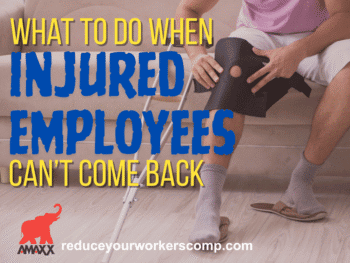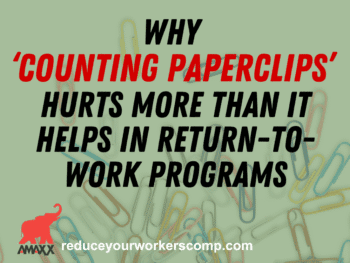
Timely injury reporting is essential to the health of every workers’ compensation program. Failure to report claims correctly and in a punctual manner can have many negative implications. This includes an adverse influence on parties’ finances, increased the money spent on claims, and hurt chances of a positive result. Interested shareholders need to be proactive on this issue and implement change to ensure all workers’ compensation claims are reported promptly.
Preservation of Evidence is Key
Once the injury occurs, the clock is ticking. Proper claim management all starts with an effective investigation that begins at the time of injury. Important things to consider include:
- Documenting the work injury and understanding how the injury took place. This is especially important when remedial changes need to be made such as removing ice or cleaning up a slippery surface;
- Getting answers to the basic questions from the employee and other witnesses. The “Five Ws and How” need to be answered – Who, What, Where, When, How, and Why;
- The injured employee may also need immediate medical care and treatment. The name of this person or health care provider is very important.
Click Link to Access Free PDF Download
“9-Element Blueprint To Create Your Workers’ Comp Employee Brochure”
Financial Impact of Prompt Injury Response
There can be a significant financial impact associated with delayed reporting of a work injury. This includes the following factors to consider:
- Delayed medical care and treatment will only cause the employee’s condition to deteriorate. Questions of compensability and preventing fraud are also important. Failure to investigate claims in a timely manner only increases the amount of money spent on a claim and does not deter fraud.
- Prompt claim investigation allows for the claim management team to better direct medical care. This can include using resources such as a disability case manager, or triage nurse to assess an injured employee’s condition, make recommendations for appropriate care, and monitor it effectively.
- Industrial commissions and labor departments require timely reporting under statute or administrative rule. These penalties can be shared by the employer and insurer, or assessed individually to one entity responsible for the delay.
This process requires the claim management team to be in contact with the employer. It is important to ensure the employer’s point of contact understands the workers’ compensation claims process, and how to conduct a best in class injury investigation.
Workers’ Compensation Fraud Prevention
Numerous studies indicate that a delay in injury response and reporting leads to increased incidents of fraud, waste, and abuse in workers’ compensation. If an injury is reported immediately, then the employee should seek immediate medical care, if necessary. This prompt response allows the employee to receive medical care that is better directed if emergency medical services are not required. Memories are also fresh after a work injury, and evidence can be preserved. This leads to members of the claim management team making better decisions when accepting a claim, or issuing a good faith denial.
Consistency is key. When employers are not consistent, it allows for unscrupulous individuals to take advantage of the system.
Points of Emphasis in Injury Reporting
Proactive claim management teams should reach out to their insured and other interested stakeholders and provide information on what to do following a work injury. This should include what documents must be completed by the employer, and important timelines to remember. Other keep points of interest should include:
- Ensure a safe workplace for all employees. This requires engagement from everyone, including those in leadership;
- Provide employees with the resources they need following a work injury. This should be done at the time of hire, and as a part of annual safety training;
- Develop training modules for supervisors and members of the human resources team on injury reporting;
- Let all employees know that discrimination and retaliation will not occur if a work injury occurs and is reported;
- Develop online and smartphone apps to assist in injury reporting. Compliance made simple leads to a quicker investigation and primary liability determinations; and
- Make First Aid kits accessible to all employees. This includes making sure they are restocked on a monthly basis.
Conclusions
A prompt injury response is important to running an effective workers’ compensation program and reducing its costs. This includes the preservation of evidence, financial impact, and reduction in the potential for fraud. This requires the claim management team to include their clients in training to help them understand the benefit to the bottom line.
 Author Michael Stack, CEO Amaxx LLC. He is an expert in workers’ compensation cost containment systems and helps employers reduce their workers’ comp costs by 20% to 50%. He works as a consultant to large and mid-market clients, is a co-author of Your Ultimate Guide To Mastering Workers Comp Costs, a comprehensive step-by-step manual of cost containment strategies based on hands-on field experience, and is founder & lead trainer of Amaxx Workers’ Comp Training Center.
Author Michael Stack, CEO Amaxx LLC. He is an expert in workers’ compensation cost containment systems and helps employers reduce their workers’ comp costs by 20% to 50%. He works as a consultant to large and mid-market clients, is a co-author of Your Ultimate Guide To Mastering Workers Comp Costs, a comprehensive step-by-step manual of cost containment strategies based on hands-on field experience, and is founder & lead trainer of Amaxx Workers’ Comp Training Center.
Contact: mstack@reduceyourworkerscomp.com.
Workers’ Comp Roundup Blog: https://blog.reduceyourworkerscomp.com/
©2020 Amaxx LLC. All rights reserved under International Copyright Law.
Do not use this information without independent verification. All state laws vary. You should consult with your insurance broker, attorney, or qualified professional.



























 Mental Health Services Before & After Settlement
Mental Health Services Before & After Settlement
